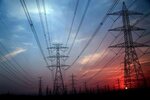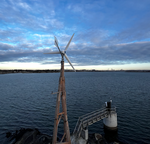12/22/2003
China is now moving more and more towards non-polluting energy sources
Hidden in a blasted valley below the Tianshan mountains of China's westernmost Xinjiang region are 172 stark white windmills that may hold the key to China’s quest for clean energy to power its booming economy. Wind power may eventually help China to avoid using coal and crude oil from the volatile Middle East, officials say. The windmills that make up China's largest wind farm can put out 90.5 megawatts of electricity a year, enough to meet just three percent of the needs of Urumqi, Xinjiang's capital. "China is moving towards non-polluting energy sources" said Sun Hao, manager of the Xinjiang Tianfeng Wind Power Co. Ltd, which runs the operation. "Xinjiang has very rich wind resources - as good as what you'd expect to find in any other part of the World." He goes on to say that demand is so great that the company is now undertaking a study to expand capacity to 140 megawatts.
Beijing, being aware of a swelling energy deficit after years of rapid growth, is pumping 16 billion yuan (US$1.9 billion) into 30 such farms over the next two years, state newspapers say. But switching to wind power - the world's fastest growing energy source, according to the European Wind Energy Association (EWEA) - will cost. China's small amount of wind farms have a generating capacity of 468 megawatts, and will thus require huge investments before beginning to make an effect on the country's energy mix. The country has installed electricity capacity of 356,000 megawatts. By comparison, Germany - the world's largest wind power generator - and the United States had installed wind power capacities of some 12,000 megawatts and 4,685 megawatts, respectively. "I wouldn't get too excited about the government investment just yet because the industry is minute. It needs a lot more money and a lot more legislation to get it going," said a Beijing-based renewable energy analyst.
EWEA estimates that installed wind power capacity has grown 30 percent annually and now totals 32,000 megawatts at the start of 2003, worldwide. By 2020, wind power should satisfy 12 percent of global electricity demand. China has been left largely behind in the wind power race, but now recognizes the need to diversify its energy sources, whether by building the world's largest hydroelectric power project in the US$25 billion Three Gorges Dam, or by increasingly considering nuclear and thermal power. The country now imports a third of its crude but is trying to secure energy supply from other regions like Russia or Australia. But Tianfeng is a less-than-auspicious start for wind power in some ways. Sited halfway between Urumqi and Turpan, its turbines can only be reached via a pothole-strewn road frequented by camels nibbling on the sparse grass along its sides.
Beijing, being aware of a swelling energy deficit after years of rapid growth, is pumping 16 billion yuan (US$1.9 billion) into 30 such farms over the next two years, state newspapers say. But switching to wind power - the world's fastest growing energy source, according to the European Wind Energy Association (EWEA) - will cost. China's small amount of wind farms have a generating capacity of 468 megawatts, and will thus require huge investments before beginning to make an effect on the country's energy mix. The country has installed electricity capacity of 356,000 megawatts. By comparison, Germany - the world's largest wind power generator - and the United States had installed wind power capacities of some 12,000 megawatts and 4,685 megawatts, respectively. "I wouldn't get too excited about the government investment just yet because the industry is minute. It needs a lot more money and a lot more legislation to get it going," said a Beijing-based renewable energy analyst.
EWEA estimates that installed wind power capacity has grown 30 percent annually and now totals 32,000 megawatts at the start of 2003, worldwide. By 2020, wind power should satisfy 12 percent of global electricity demand. China has been left largely behind in the wind power race, but now recognizes the need to diversify its energy sources, whether by building the world's largest hydroelectric power project in the US$25 billion Three Gorges Dam, or by increasingly considering nuclear and thermal power. The country now imports a third of its crude but is trying to secure energy supply from other regions like Russia or Australia. But Tianfeng is a less-than-auspicious start for wind power in some ways. Sited halfway between Urumqi and Turpan, its turbines can only be reached via a pothole-strewn road frequented by camels nibbling on the sparse grass along its sides.
- Source:
- Online editorial www.windfair.net
- Author:
- Trevor Sievert, Online editorial journalist
- Email:
- press@windfair.net
- Keywords:
- China, EWEA, renewable energy, wind energy, wind turbine








